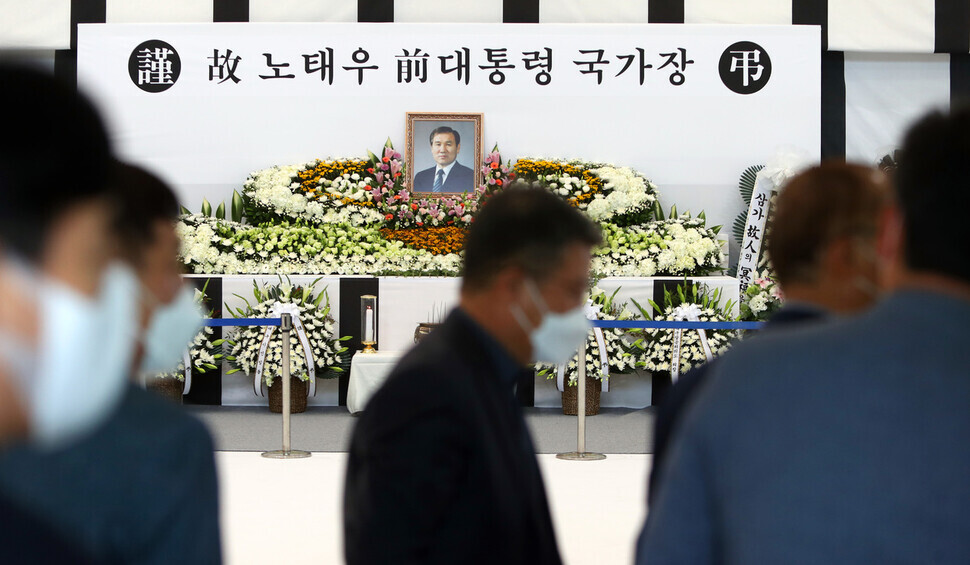hankyoreh
Links to other country sites 다른 나라 사이트 링크
[Editorial] S. Korea should not honor Roh Tae-woo with state funeral

The late former President Roh Tae-woo will get a state funeral. Because he committed the unforgivable crime of killing innocent people while overthrowing the government, we must express our regret over the decision to give him the highest honor of a state funeral for a former head of state.
Prime Minister Kim Boo-kyum on Wednesday said at a Cabinet meeting, "While serving as the nation's 13th president, [Roh] contributed to many achievements in national development," adding, "The government will honor his achievements and do everything to honor him through a state funeral."
The Ministry of the Interior and Safety added, "It is true that Former President Roh made historic mistakes with respect to the military coup on Dec. 12, 1979, and the Gwangju Uprising, but we also considered the contributions he made after being elected under the direct electoral system, including the Inter-Korean Basic Agreement and other policies on North Korea, as well as efforts to pay compensation after receiving a criminal sentence."
The ministry also announced a five-day period of mourning from Tuesday to Sunday.
Roh during his term did carry out major achievements in Nordpolitik and inter-Korean relations. He formed diplomatic relations with the communist bloc countries of the Soviet Union and China and established a historic inter-Korean accord in 1991 that led to both Koreas simultaneously entering the United Nations the same year.
Yet the decision to grant him a state funeral is wrong as the crimes he committed far outweigh his presidential achievements. Roh was an accomplice who led the 1979 military coup with Chun Doo-hwan and violated the nation's constitutional order. He was also deeply involved in the expansion of martial law on May 17, 1980, and the massacre of Gwangju residents the next day — two incidents that trampled on the people's aspirations for democracy.
The Supreme Court in 1997 sentenced Chun to life in prison and gave Roh a 17-year sentence for leading a military insurrection and mutiny. Thus, a legal and historical judgment was handed down. According to his son, Roh is said to have left a will saying, "I hope for deep forgiveness for my mistakes." But while alive, the ex-president never directly apologized to the victims of the massacre in Gwangju or their families, nor did he ask for their forgiveness.
Article 2 of the State Funeral Act stipulates that former and incumbent presidents may receive a state funeral. Article 1 denotes the funeral's purpose of contributing to national unity by “holding a funeral in a pious and solemn manner where any person respected for having rendered distinguished service to the State or society, passes away.”
The question, then, is how many people believe the decision to honor Roh a state funeral is consistent with this law. The city of Gwangju will reportedly not adhere to the State Funeral Act, as it does not plan to install memorial alters or lower the national flag to half-mast.
The government's decision was apparently made in consideration of the sentiments and arguments of certain conservatives ahead of next year's presidential election. Yet chances are high that this will be the wrong precedent that disrupts the historical consciousness that our society has struggled to establish.
The Act on the Establishment and Management of National Cemeteries states that anyone sentenced to imprisonment without prison labor or a heavier punishment for crimes of insurrection or treason or who is sentenced to one or more years of imprisonment without prison labor for embezzling government funds cannot be buried at a national cemetery. This standard should also apply to eligibility for a state funeral. Thus, we hope that the National Assembly will actively listen to public opinion on this matter.
Please direct questions or comments to [english@hani.co.kr]

Editorial・opinion
![[Editorial] Penalties for airing allegations against Korea’s first lady endanger free press [Editorial] Penalties for airing allegations against Korea’s first lady endanger free press](https://flexible.img.hani.co.kr/flexible/normal/500/300/imgdb/original/2024/0502/1817146398095106.jpg) [Editorial] Penalties for airing allegations against Korea’s first lady endanger free press
[Editorial] Penalties for airing allegations against Korea’s first lady endanger free press![[Editorial] Yoon must halt procurement of SM-3 interceptor missiles [Editorial] Yoon must halt procurement of SM-3 interceptor missiles](https://flexible.img.hani.co.kr/flexible/normal/500/300/imgdb/child/2024/0501/17145495551605_1717145495195344.jpg) [Editorial] Yoon must halt procurement of SM-3 interceptor missiles
[Editorial] Yoon must halt procurement of SM-3 interceptor missiles- [Guest essay] Maybe Korea’s rapid population decline is an opportunity, not a crisis
- [Column] Can Yoon steer diplomacy with Russia, China back on track?
- [Column] Season 2 of special prosecutor probe may be coming to Korea soon
- [Column] Park Geun-hye déjà vu in Yoon Suk-yeol
- [Editorial] New weight of N. Korea’s nuclear threats makes dialogue all the more urgent
- [Guest essay] The real reason Korea’s new right wants to dub Rhee a founding father
- [Column] ‘Choson’: Is it time we start referring to N. Korea in its own terms?
- [Editorial] Japan’s rewriting of history with Korea has gone too far
Most viewed articles
- 160% of young Koreans see no need to have kids after marriage
- 2Presidential office warns of veto in response to opposition passing special counsel probe act
- 3Months and months of overdue wages are pushing migrant workers in Korea into debt
- 4[Reporter’s notebook] In Min’s world, she’s the artist — and NewJeans is her art
- 5[Editorial] Penalties for airing allegations against Korea’s first lady endanger free press
- 6Japan says it’s not pressuring Naver to sell Line, but Korean insiders say otherwise
- 7OECD upgrades Korea’s growth forecast from 2.2% to 2.6%
- 8Hybe-Ador dispute shines light on pervasive issues behind K-pop’s tidy facade
- 9Inside the law for a special counsel probe over a Korean Marine’s death
- 10At heart of West’s handwringing over Chinese ‘overcapacity,’ a battle to lead key future industries